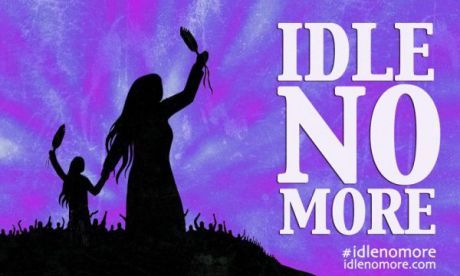Features
You are here
Idle No More: First Nations women lead the way

March 8, 2013
"A nation is not conquered until the hearts of its women are on the ground" --Cheyenne proverb.
The burgeoning Idle No More movement has shown that First Nations are far from conquered. Women are prominent activists and speakers for the movement. The very name Idle No More grew from discussions among four Saskatchewan women, calling for grass-roots opposition to the Tory omnibus budget bill that contains so many attacks on environmental protection.
One of the four, Nina Wilson, from the Nakota and Plains Cree First Nation explained their goal: “We are trying to help people get their voices back so that we can make more change and we are able to have more of a First Nations voice…not just a First Nations, but an Indigenous voice, and not just an Indigenous voice but a grassroots voice, because it affects us all.”
With her hunger strike in direct challenge to Harper’s arrogant approach to the environment, and assimilationist views on First Nations, Attawapiskat Chief Theresa Spence became for a time the most visible Idle No More activist. In spite of often sexist verbal attacks, she remained adamant in her call for direct nation-to-nation dialogue with Harper and Governor General David Johnson.
Back in her home community, her leadership inspired a community blockade of the Victor diamond mine, owned by De Beers. Protests focused on the billions in profits extracted from the land, while communities continue to face hardship and lack of adequate housing.
Idle No More has brought new names--Pam Palmater, Janice Makokis and others–-to prominence in First Nations discussions that have too long been dominated by men. The Indian Act explicitly tried to extinguish the traditional leadership role of women in Indigenous culture, as part of its drive to impose colonial rule. This speaks to the resilience of First Nations culture, struggling to perpetuate itself in the face of deliberate oppression.
Bonita Lawrence, in Gender, Race, and the Regulation of Native Identity in Canada and the United States states: “Understanding how colonial governments have regulated Native identity is essential for Native people, in attempting to step away from the colonizing frameworks that have enmeshed our lives, and as we struggle to revive the identities and ways of living that preceded colonization.”
First Nations women face sexist violence as well as racism. According to 2004 data, Aboriginal women make up the majority of violence victims and are 3.5 times more likely to experience incidents of violence compared to non-Aboriginal women. In December a First Nations woman in Thunder Bay was kidnapped and raped. Her two white assailants told her it was in retaliation for Idle No More, and that they planned to attack again. A cultural support worker told the CBC: “The woman was told that native people do not deserve their treaty rights as she was being beaten and strangled and raped.”
In response to this sort of violence, Sisters in Spirit was formed in 2004 to create awareness. In 2010, Stephen Harper’s Tories cut the funding for the project. The day before the February 14 memorial this year, Human RIghts Watch issued a report about police abuse of indigenous women and failure to investigate crimes. Harper and his cabinet ministers refused to meet with Human Rights Watch to review the report, and completely ignored the findings by calling on indigenous women to "just get on and do it"--demanding women go to police with complaints knowing the well-founded fear of retaliation. Ten days after the report, an 18-year old First Nation girl in Edmonton went to police bruised and bloody from a rape, and the police arrested her instead.
Idle No More reveals the two realities faced by Indigenous women: the powerful leadership role they play, and the colonialism-bred violence they face inside their communities and out. The more Idle No More succeeds, the better for women.
Section:










